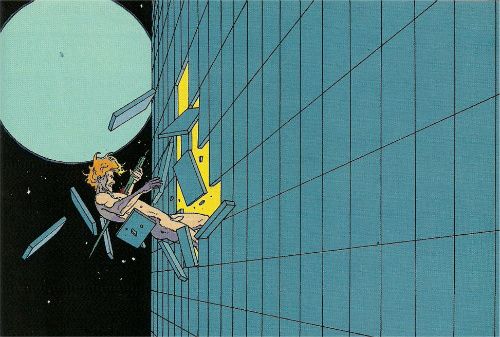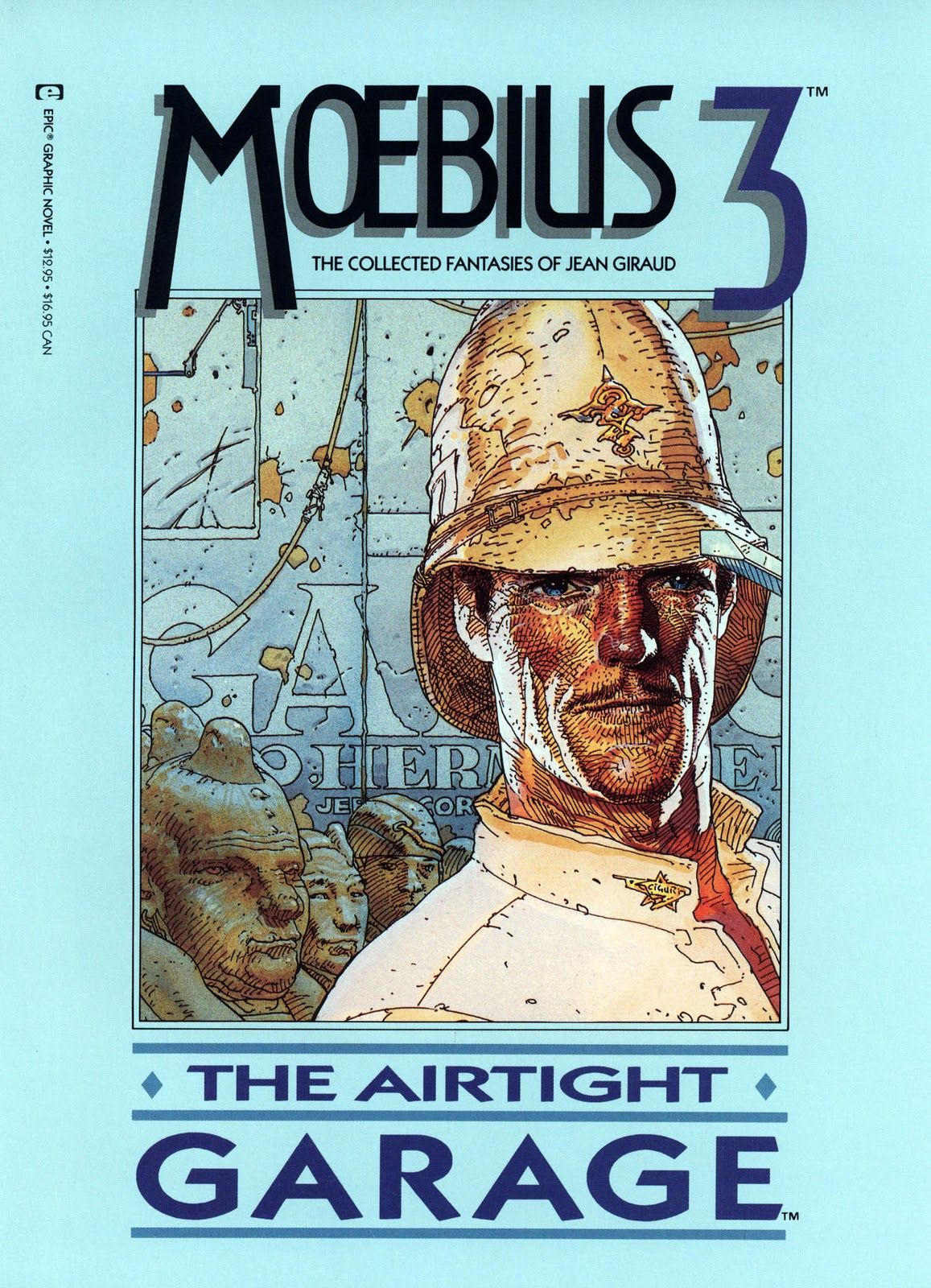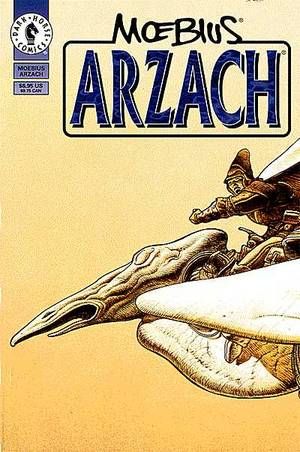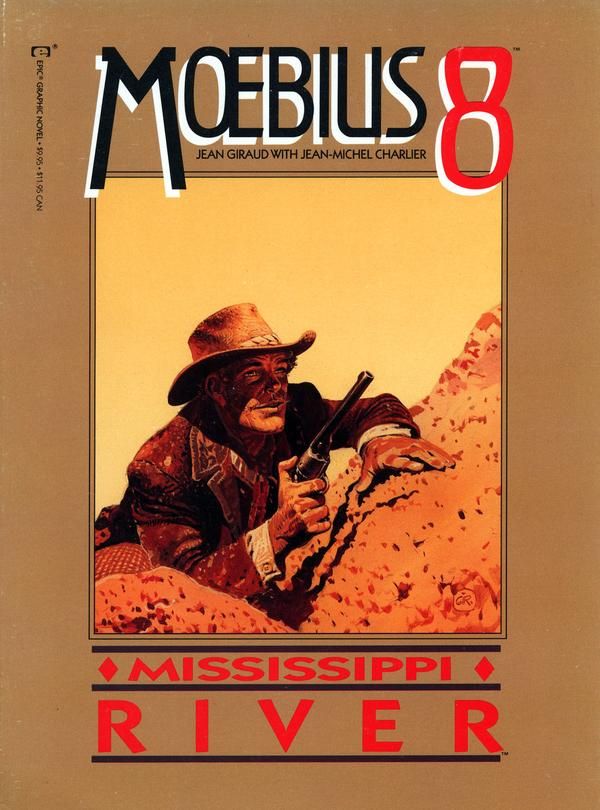Perhaps one of the most ironic and galling things for anyone who cares about the work of the late Jean "Moebius" Giraud, who passed away last weekend, is that for all the heartfelt remembrances and accolades that were offered in his memory, virtually none of his work is currently available in print in North America. Oh, there are few titles certainly, most notably from Humanoids, but the bulk of his bibliography, including several of his major, most influential works, remain in the back rooms of used bookstores and warehouses for intrepid and hardy collectors to track down.
With that in mind, I asked my friend and noted comics critic Joe "Jog" McCulloch -- whose Moebius knowledge far, far, far exceeds my own -- to help me put together a quick "essential" list of Moebius comics in English that, while perhaps not necessarily available for dirt cheap, can nevertheless be tracked down and read. This is obviously is not a definitive type of list -- how can it be with someone who had as extensive and stellar a bibliography as Moebius did? But still we hope it will offer a good starting point for the uninitiated, provided you have the time and money to track these comics down.
(Fair warning: A slighly nsfw image can be found after the jump)
1. The Airtight Garage (Marvel/Epic). "Is this anything like 'Naked Lunch'?" That's what my physical therapist said to me after I had made a remarkably poor attempt at describing what is generally regarded as Moebius' masterpiece. (What, you mean you don't talk comics with your health care providers?) I suppose on the surface there are some similarities, most notably that both are obsessed with conspiracies and spying and both show little regard for a straightforward narrative or making any sort of sense whatsoever. However, while Burroughs' novel tightly coils in around itself, to the point at times where you feel you're being suffocated by the prose, Garage pulsates with life, slowly unwinding its various plot strands, and delighting you in the various ways those strands connect, or fail to. Despite its title, the book feels surprisingly open and dynamic. Moebius allegedly wrote the story in a stream-of-consciousness fashion, constantly introducing new scenarios and challenges and then attempting to explain them in the subsequent chapters. As a result, attempts a simple plot summation/description fails me, but, as Sean Witzke has noted, Garage might best be described as a whizzing tour through just about every genre the comics medium is known for -- westerns, sci-fi, adventure, you name it. References to other cartoonists like Crumb and Eisner pop up unexpectedly. In other words, you can feel the boundless joy Giraud has not only for in taking such risky chances with his story, but for his chosen profession in general. Thus the book manages to perfectly encapsulate that sense of wonder, fantasy and pure grit that runs through so many of the Moebius' comcis. The Airtight Garage might not be a comic that makes for easy descriptions, but I'll be goddamned if it isn't a helluva lot of fun to read. -- Chris Mautner.
2. The Incal (Humanoids). Easily the biggest of Moebius’ works readily available in English -- or at least imminently available, as a fresh printing is due in May -- The Incal marked both a massive expansion of the ‘dirty future’ sci-fi noir style of The Long Tomorrow and something of a reconciliation between the improvisational and collaborative aspects of the artist’s process. Writer Alejandro Jodorowsky might have a reputation as a madman polymath, but his works tend to marry esoteric interests with pedagogical stratagems eyeing mental and spiritual health; thus, despite a writing process that purportedly involved physically acting the comic out in front of a rapidly-sketching Giraud, the series’ crap-detective-stumbles-upon-immense-power-and-interested-parties-butt-in scenario proves remarkably direct in its simple, tarot-derived characterizations and episodic cliffhanging suspense, all the better to dole out metaphors of psychological and soulful healing. For its artist, the result was an expansive set of rightly ‘Moebius’ images that behaved in nearly as orderly an action comic manner as his earlier horseback sagas. The vagaries of publishing have left this a gateway comic by default, but it still feels a little like fate. -- Joe McCulloch
3. Arzach (Dark Horse/Marvel-Epic). The first story is basically an elaborate set-up for a very minor joke: An medievally-garbed warrior, riding a pterodactyl over a rocky, desert-like landscape, spies a beautiful naked woman. After getting rid of the boyfriend in a rather elaborate manner he hurries back to the hot lady's place only to discover that she has a literal face loke a dog. Rimshot. Fin.
And yet, while the substance of the plot may seem like third-rate Benny Hill, everything else seems strange and wonderfully new. The elaborate page layouts that harken back to the art nouveau movement, the strange, desolate landscape, the sheer amount of time Moebius takes in telling the story, the way he lingers on seemingly inconsequential moments and vistas just to create a sense of grandeur and mystery -- it all suggests a corner has been turned, that this artist who up till now has been mainly known for cowboy tales has found a new way of approaching his chosen medium. The four initial, wordless stories that make up the Arzach collection were some of the first to appear Metal Hurlant, the magazine Moebius founded with fellow cartoonists Jean-Pierre Dionnet, Philippe Druillet and Bernard Farkas, and one of the first works that appeared in its English cousin, Heavy Metal. Each tale gets a little stranger and more disjointed and surreal as Moebius becomes more concerned with evoking a moment than telling a "normal" story, until the final tale amounts to a sequence of images that have little to do with each other apart from the appearance of the title character. Despite the seeming strangeness of these works, their influence is apparent, not just in virtually every comic that subsequently appeared in Heavy Metal, but in unexpected places, like Hayao Miyazaki's Nausicca. Moebius returned to Arzach a number of times, even giving him a speaking role, but it's hard to imagine those comics have the same sort of bomb-throwing impact that these four initial stories did. Dark Horse put out an edition back in the 1990s, and you might be able to find the Marvel/Epic volume, but you can probably even track down a French edition and consume it without any trouble. -- Chris Mautner
4. The Gardens of Aedena (Marvel/Epic). Moebius’ most sweeping solo work remains among his most obscure. From 1983 to 2001, Giraud worked intermittently on The World of Aedena, a five-volume project with origins in hired gun assignments for a finance magazine and an automobile manufacturer, yet nonetheless utterly suffused with the artist’s fascination with the mystic teachings of guru Jean-Paul Appel Guéry and the dietary theories of Guy-Claude Burger. For a while Moebius seemed to view it as a magnum opus that would begin the work of uniting his comics into a vast shared universe, and Marvel/Epic treated it as the heart of its 1987-94 line of softcover reprint albums, titled simply Moebius - the first four volumes make up albums 1, 5, 7 and 9, while the fifth and final album remains untranslated.
Today, it’s perhaps better to read the project as discreet allegorical episodes. Upon A Star (or: Moebius 1) remains an enduring favorite for the artist’s use of a razor-sharp streamlined visual style, but I prefer the eccentric self-interrogation of The Gardens of Aedena (or: Moebius 5), which sees heroes Stel & Atan stranded on a lush, leafy world as participants in the galaxy’s friendliest raw foods harangue. Images of fairy folk cavorting around a crystal star intermingle with the gradually-undressing duo’s transformation from sexless processed consumers to visibly male and female beneficiaries of the instinctive nutrition lifestyle, until the theretofore cuddly Stel does something Really, Really Bad, transforming the journey into a distinctly ominous march into hallucinatory sex and an all-nude, tentacle hentai-tinged (and Japanese sound effect-laden) battle with a giant morphing dinosaur as representative of the rejection terrors lurking behind masculine damsel-in-distress narratives. And while it’d be easy to dub this stuff gorgeous lunacy, it ranks with the better of Moebius’ comics in conveying something moving and half-conscious and deep and true by its fabulous surface. -- Joe McCulloch
5. The Long Tomorrow (Marvel/Epic). On the face of it, it seems so simple. A hard-boiled Mike Hammer-type detective story laced with sci-fi, futuristic trappings and tongue planted firmly in cheek. But writer Dan O'Bannon's genre exercise far exceeded its pastiche origins when Moebius asked if he could try his hand at illustrating the story. As much as Long Tomorrow manages to evoke its detective influences, it also manages to transcend them, both with its humor and with it's stunning ability to create a city that, while fantastic, feels utterly lived in and vibrant. The nameless urban sprawl that gumshoe Pete Club inhabits is both gritty and visionary at the same time, a cramped, dynamic wonderland full of swooping hovercars, four-armed tough guys, erector-set styled robots and sprawling, crowded cityscapes. No wonder the story helped serve as the inspiration for Blade Runner. If you're included to track down a copy, go for the Epic Comics edition (Volume 4 to those of you keeping score) which contains a number of other great stories as well, including "Approaching Centauri" and "Variation No. 4070 on 'the' Theme." -- Chris Mautner
6. Mississippi River (Marvel/Epic). This isn’t Robot 22, so there’s not enough room to list all the good Moebius comics -- though sadly, there’s more than enough room to list the ones in print -- but we’d be totally remiss to ignore the many Old West genre pieces Giraud signed under his birth name. Blueberry, of course, spans 1965 to 2007 -- nearly the whole of Giraud’s professional career -- but it can be a daunting prospect. Maybe the scrupulous hunter will be better introduced by 1979’s Mississippi River (or: Moebius 8), a replacement western Giraud and writer Jean-Michel Charlier serialized in Métal Hurlant when a payment dispute halted Blueberry production. It’s your quintessential ripping yarn, seeing cocky gambler and Union soldier Jim Cutlass inheriting part of a Louisiana plantation and dealing with local & national histories of violence. It’s a style of ‘mainstream’ comics largely unfamiliar to North American readers, but Giraud & Charlier were already old adepts at blending U.S. mythology (sometimes uneasily) with nasty truths. Certainly Giraud enjoyed the diversion, since after Charlier’s death he revived the character for six 1990s sequels with himself as writer and Christian Rossi as artist. But then, both Moebius’ untranslated works and his output as just a writer are more topics from a life too large for this space. -- Joe McCulloch




